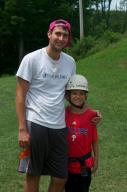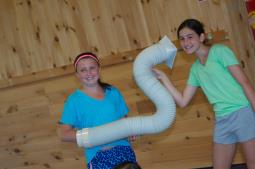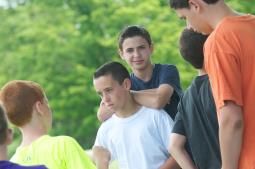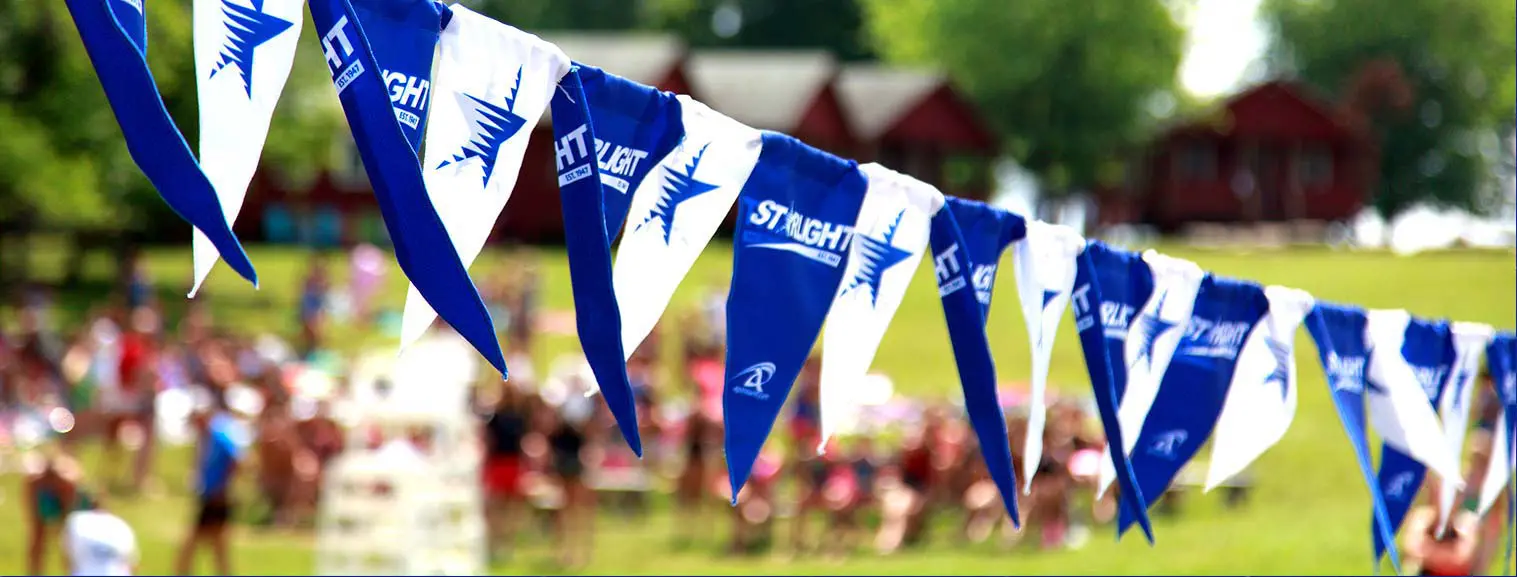 Kindness is a theme at Camp Starlight this summer. The term is an interesting one. This blog writer was an English major and a fun hobby is breaking down words and their meanings. Kindness is often erroneously interpreted as an adjective, a way for people to describe themselves in job interviews or during icebreaker sessions. Kindness is not an adjective, though. Adjectives describe a person, place, or thing. Kindness is a noun. It is a thing. A thing that specifically refers to “the act of being kind.” That’s a verb. An action. It’s something a person must demonstrate. One of the definitions of “kind” is “uniting by common traits or interests.” Although this is not the popular definition for kind, it’s actually the most accurate. One demonstrates kindness by giving of oneself, without the expectation of something in return, in order to lift or raise another. In it’s simplest essence, it’s a physical expression of empathy.
Kindness is a theme at Camp Starlight this summer. The term is an interesting one. This blog writer was an English major and a fun hobby is breaking down words and their meanings. Kindness is often erroneously interpreted as an adjective, a way for people to describe themselves in job interviews or during icebreaker sessions. Kindness is not an adjective, though. Adjectives describe a person, place, or thing. Kindness is a noun. It is a thing. A thing that specifically refers to “the act of being kind.” That’s a verb. An action. It’s something a person must demonstrate. One of the definitions of “kind” is “uniting by common traits or interests.” Although this is not the popular definition for kind, it’s actually the most accurate. One demonstrates kindness by giving of oneself, without the expectation of something in return, in order to lift or raise another. In it’s simplest essence, it’s a physical expression of empathy.
There is a famous quote that says ‘no kind deed goes unpunished.’ The quote refers to the notion that the act of being kind is not only often thankless but requires some level of sacrifice in the form of pain, inconvenience, and, yes, glory. Unfortunately, this is true. People give up luxuries, time, effort, money, and countless other aspects of comfort in the name of being kind, often not even receiving so much as a ‘thank you’ in return. But sacrifice and the lack of recognition for it does not deter those who understand that the true reward of a kind deed is in the act.
notion that the act of being kind is not only often thankless but requires some level of sacrifice in the form of pain, inconvenience, and, yes, glory. Unfortunately, this is true. People give up luxuries, time, effort, money, and countless other aspects of comfort in the name of being kind, often not even receiving so much as a ‘thank you’ in return. But sacrifice and the lack of recognition for it does not deter those who understand that the true reward of a kind deed is in the act.
 Expressing kindness is not always easy and the reward seldom comes in the form of reciprocation but rather the self-realization that you have been able to translate your own life experiences in a way that allows you to raise up someone else. An individual who recently delivered a message about kindness to the entire camp emphasized recognizing the difference between a nice person and a friend. Similarly, being “nice” is not synonymous with being kind. Nice is something you choose to be in order to establish yourself as someone who is pleasant. Your motivation for being pleasant is that others will be pleasant, thus, “nice” in return. Being nice rather than kind places expectations on others. But a truly kind deed is an expression of compassion driven by empathy. It does not expect kindness in return but appreciates the opportunity to show others that you, in some way, understand and identify with a challenge in their lives and, because of that, are not only willing but wanting to alleviate the burden in some way.
Expressing kindness is not always easy and the reward seldom comes in the form of reciprocation but rather the self-realization that you have been able to translate your own life experiences in a way that allows you to raise up someone else. An individual who recently delivered a message about kindness to the entire camp emphasized recognizing the difference between a nice person and a friend. Similarly, being “nice” is not synonymous with being kind. Nice is something you choose to be in order to establish yourself as someone who is pleasant. Your motivation for being pleasant is that others will be pleasant, thus, “nice” in return. Being nice rather than kind places expectations on others. But a truly kind deed is an expression of compassion driven by empathy. It does not expect kindness in return but appreciates the opportunity to show others that you, in some way, understand and identify with a challenge in their lives and, because of that, are not only willing but wanting to alleviate the burden in some way.
“So what does this have to do with camp?” you might be asking yourself by now. Quite simply, that the concept of kindness, like camp, though it may on the surface seem complicated and, at times, chaotic, is really quite simple at its core. It’s saying ‘hi’ to an individual every day, regardless of whether they ever say ‘hi,’ in return. It’s paying a compliment to a fellow staff member or camper without expecting one in return. It’s helping a friend, bunkmate, or maybe someone you don’t even know when they seem discouraged or down, without judgment and without the expectation of a favor in return. Kindness is not a loan. It’s a gift…a gift of yourself. And perhaps the most encouraging aspect of Camp Starlight is how well so many people here seem to understand that. You hear campers encouraging each other as you stroll by fields and courts. Campers and staff support each other in overcoming fears and challenges. Maybe the camp environment promotes the development of “kind” skills, just as it promotes the development of the ability to kick a soccer ball, serve a tennis ball, or dribble a basketball. Or maybe it’s telling of the values of Camp Starlight as a whole that kindness is so precious it has been made a theme for an entire summer so that it’s population and extended family may contemplate it’s worth in our lives as well as the lives of others.
may on the surface seem complicated and, at times, chaotic, is really quite simple at its core. It’s saying ‘hi’ to an individual every day, regardless of whether they ever say ‘hi,’ in return. It’s paying a compliment to a fellow staff member or camper without expecting one in return. It’s helping a friend, bunkmate, or maybe someone you don’t even know when they seem discouraged or down, without judgment and without the expectation of a favor in return. Kindness is not a loan. It’s a gift…a gift of yourself. And perhaps the most encouraging aspect of Camp Starlight is how well so many people here seem to understand that. You hear campers encouraging each other as you stroll by fields and courts. Campers and staff support each other in overcoming fears and challenges. Maybe the camp environment promotes the development of “kind” skills, just as it promotes the development of the ability to kick a soccer ball, serve a tennis ball, or dribble a basketball. Or maybe it’s telling of the values of Camp Starlight as a whole that kindness is so precious it has been made a theme for an entire summer so that it’s population and extended family may contemplate it’s worth in our lives as well as the lives of others.




